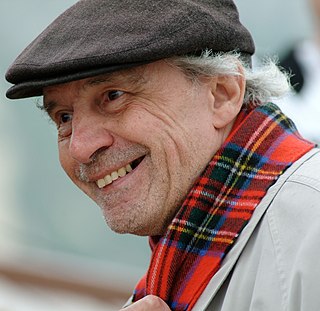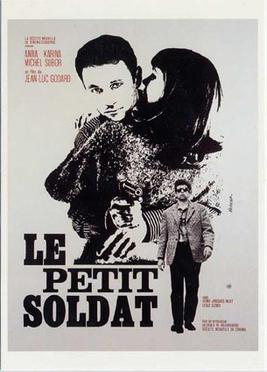Jacques Mandelbaum (born 1 May 1958, in Neuilly-sur-Seine) is a French journalist and film critic, currently working for the newspaper Le Monde which he joined in 1995. He is the author of numerous works on the cinema including a biographical book on Jean-Luc Godard.

Cahiers du Cinéma is a French film magazine co-founded in 1951 by André Bazin, Jacques Doniol-Valcroze, and Joseph-Marie Lo Duca. It developed from the earlier magazine Revue du Cinéma involving members of two Paris film clubs—Objectif 49 and Ciné-Club du Quartier Latin.

Jean-Luc Godard was a French and Swiss film director, screenwriter, and film critic. He rose to prominence as a pioneer of the French New Wave film movement of the 1960s, alongside such filmmakers as François Truffaut, Agnès Varda, Éric Rohmer and Jacques Demy. He was arguably the most influential French filmmaker of the post-war era. According to AllMovie, his work "revolutionized the motion picture form" through its experimentation with narrative, continuity, sound, and camerawork. His most acclaimed films include Breathless (1960), Vivre sa vie (1962), Contempt (1963), Band of Outsiders (1964), Alphaville (1965), Pierrot le Fou (1965), Masculin Féminin (1966), Weekend (1967) and Goodbye to Language (2014).

The New Wave, also called the French New Wave, is a French art film movement that emerged in the late 1950s. The movement was characterized by its rejection of traditional filmmaking conventions in favor of experimentation and a spirit of iconoclasm. New Wave filmmakers explored new approaches to editing, visual style, and narrative, as well as engagement with the social and political upheavals of the era, often making use of irony or exploring existential themes. The New Wave is often considered one of the most influential movements in the history of cinema.

Jacques Rivette was a French film director and film critic most commonly associated with the French New Wave and the film magazine Cahiers du Cinéma. He made twenty-nine films, including L'Amour fou (1969), Out 1 (1971), Celine and Julie Go Boating (1974), and La Belle Noiseuse (1991). His work is noted for its improvisation, loose narratives, and lengthy running times.
Serge Daney was a French movie critic. He was a major figure of Cahiers du cinéma which he co-edited in the late 1970s. He also wrote extensively about films, television, and society in the newspaper Libération and founded the quarterly review Trafic shortly before his death. Highly regarded in French and European film criticism circles, his work remained little known to English-speaking audiences until recent translations. A first book-long interview, Postcards from the Cinema, was published in 2007 and a collection of his writings prior to 1982, The Cinema House and the World, was published in 2022.

Anne Wiazemsky was a French actress and novelist. She made her cinema debut at the age of 18, playing Marie, the lead character in Robert Bresson's Au hasard Balthazar (1966). A year later she married the director Jean-Luc Godard and appeared in several of his films, including La Chinoise (1967), Week End (1967), and One Plus One (1968).

Jacques Rozier was a French film director and screenwriter. He was one of the lesser-known members of the French New Wave movement and has collaborated with Jean-Luc Godard. Three of his films have been screened at the Cannes Film Festival. In 1978, he was a member of the jury at the 28th Berlin International Film Festival.

Le petit soldat is a French film written and directed by Jean-Luc Godard in 1960, but its release was delayed until 1963 by censorship. It was the first project on which Godard worked with Anna Karina, who stars alongside Michel Subor, but the third to be released.
Jacques Becker was a French film director and screenwriter. His films, made during the 1940s and 1950s, encompassed a wide variety of genres, and they were admired by some of the filmmakers who led the French New Wave movement.

Luc Moullet is a French film critic and filmmaker, and a member of the Nouvelle Vague or French New Wave. Moullet's films are known for their humor, anti-authoritarian leanings and rigorously primitive aesthetic, which is heavily influenced by his love of American B-movies.

Raphaël Bassan is a French film critic and journalist, who has specialized in experimental film and the history of cinema. He has also made three short movies.
Le Parti des chosesa.k.a.Bardot et Godard or Le Parti des choses: Bardot et Godard is a 1964 short documentary directed by Jacques Rozier on the making of Jean-Luc Godard's film Le Mépris. It is included on the Criterion Collection DVD of Le Mépris.

Freddy Buache was a Swiss journalist, cinema critic and film historian. He was the director of the Swiss Film Archive from 1951 to 1996. He was a privatdozent at the University of Lausanne.
Letter in Motion to Gilles Jacob and Thierry Frémaux is a 2014 short film directed by Jean-Luc Godard.

Jean Douchet was a French film director, historian, film critic and teacher who began his career in the early 1950s at Gazette du Cinéma and Cahiers du cinéma with members of the future French New Wave.

Jacques Rivette was a French film director, screenwriter and film critic. He wrote and directed twenty feature films, including the two-part Joan the Maiden, eight short films and a three-part television documentary. He also acted in small roles and participated in documentaries. After making his first short film, Aux quatre coins, in his hometown of Rouen, Rivette moved to Paris in 1949 to pursue a career in filmmaking. While attending film screenings at Henri Langlois' Cinémathèque Française and other ciné-clubs he gradually befriended many future members of the French New Wave, including François Truffaut, Jean-Luc Godard, Éric Rohmer and Claude Chabrol. Rivette's association with this group of young cinephiles led to the start of both his filmmaking career and his work in film criticism. In collaboration with his new friends, Rivette made two more short films and worked as a cinematographer and editor on films by Rohmer and Truffaut. He also worked in small roles and as an assistant director to Jean Renoir on French Cancan and Jacques Becker on Ali Baba and the Forty Thieves. During this period he began writing film criticism for the magazine Gazette du Cinéma and later Cahiers du Cinéma, and was one of the most respected writers by his peers.

This is a bibliography of articles and books by or about the director and film critic Jacques Rivette.
Bernard Eisenschitz is a French film critic, subtitler and historian. He has also directed, produced and restored films.
La Cause du peuple was a French newspaper. The newspaper was founded on May 1, 1968 by Roland Castro and was the press organ of the party Gauche prolétarienne.

Pierre-André Boutang was a French documentary filmmaker, producer and director. He was one of the leaders of the Franco-German channel Arte as well as of La Sept previously.